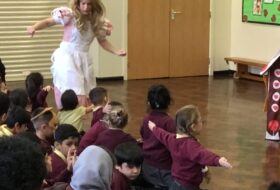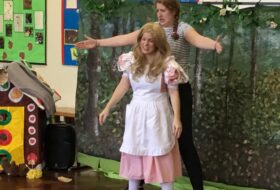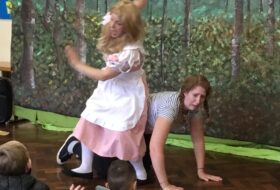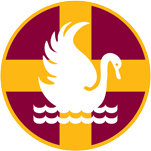CURRICULUM
English
English Curriculum Statement
Spoken Language
The National Curriculum for English reflects the importance of spoken language in children’s development across the whole curriculum.
| Spoken language – years 1 to 6 |
| Statutory requirements |
| Pupils should be taught to: – listen and respond appropriately to adults and their peers – ask relevant questions to extend their understanding and knowledge – use relevant strategies to build their vocabulary – articulate and justify answers, arguments and opinions – give well-structured descriptions, explanations and narratives for different purposes, including for expressing feelings – maintain attention and participate actively in collaborative conversations, staying on topic and initiating and responding to comments – use spoken language to develop understanding through speculating, hypothesising, imagining and exploring ideas – speak audibly and fluently with an increasing command of Standard English – participate in discussions, presentations, performances, role play/improvisations and debates – gain, maintain and monitor the interest of the listener(s) – consider and evaluate different viewpoints, attending to and building on the contributions of others – select and use appropriate registers for effective communication |
The ability to communicate effectively is a key skill. To speak English fluently and articulately, to express ideas and interact with others is fundamental to academic success and to a good quality of life in general.
There is robust evidence to show the link between the quality of classroom talk and attainment in core subjects. Poor spoken language skills limit children’s attainment.
At St. Hugh’s, spoken language skills are taught at an age-appropriate level. We place an emphasis on increasing children’s vocabulary across the core and wider curriculum.
We use the Communication Trust’s ‘Communicating the Curriculum Guidance Statements’ for each year group to shape our Spoken Language curriculum.
For more information click the following link, Communicating the Curriculum guidance statements
Reading and Writing
Reception and Key Stage One:
The children begin the process of learning to read and write using Read Write Inc.
The children learn to:
- read accurately and fluently with good comprehension
- form each letter, spell correctly, and compose their ideas step-by-step
Firstly, they learn one way to read the 40+ sounds and blend them into words. Then they learn to read the same sounds with alternative graphemes. They experience success from the very beginning. Reading books are closely matched to the children’s increasing knowledge of phonics and ‘tricky’ words. As children re-read the stories, their fluency increases. The children are encouraged to take home the phonics books they have been reading in school to practise and consolidate their reading and phonics skills.
During Read, Write Inc. lessons, the children are also taught to write letters and simple words early on and build on their success. They write every day, rehearsing out loud what they want to write, and composing sentence by sentence, until they are confident enough to write independently. They use their knowledge of the alphabetic code and the ‘tricky’ words they have learnt. They practise handwriting every day: sitting at a table comfortably, learning correct letter formation and joining letters speedily and legibly. The children build up their spelling knowledge so they can spell complex words confidently. They use adventurous vocabulary in their writing because they have encountered such language in their reading and they have talked about what words mean.
Read, Write Inc. is taught daily throughout EYFS (Early Years Foundation Stage) and KS1 (Key Stage 1). Children are grouped according to ability and taught by a trained adult. The children are assessed every half-term and groups are re-arranged to ensure they are always making progress relative to their ability. Any child falling behind is given intensive support to ensure they catch up as rapidly as possible.
In addition to Read, Write Inc. phonics, the children in EYFS and Y1 have a story and vocabulary session (Talk through Stories) each day which is designed to extend and deepen their vocabulary and understanding of language. Each story spans over two weeks. In the first week, the children get to know the story very well – the plot, the characters, and their actions and motives. In the second week, the vocabulary week, the children focus on eight words from the story. These are words that the children are unlikely to hear in everyday conversation but will come across in stories. Children’s understanding of each word is then developed in the context of their everyday lives.
The children in Y2, when they have completed the phonics programme, are taught reading through whole class shared reading in a similar way to KS2 (Key Stage 2).
Key Stage Two:
Read, Write Inc. continues into KS2 for those children who still need it and for those children who join our school in Y3-Y6 without the appropriate reading and writing skills. They are taught daily by a trained adult in the same way the EYFS and KS1 children are.
Whole class shared reading takes place every day in KS2 using Steps to Read. Steps to Read provides planning and resources through carefully crafted units of work which empower teachers to teach all aspects of word reading and comprehension through high-quality fiction, non-fiction and poetry texts. The units also provide sound curriculum knowledge to support a variety of foundation subjects.
Children who are unable to access the whole class shared reading lessons due to limited understanding of English have a story/vocabulary session each day which is similar to the story/vocabulary session in EYFS and Y1.
We teach writing using ‘Read to Write’ which is an evidence-based teaching approach to writing. Teachers provide high-quality teaching of writing through high-quality literature. The texts are engaging, vocabulary-rich and provide a wealth of writing opportunities across all genres.
Six texts are studied over the course of the year i.e. one each half term. Three weeks each half-term are spent on narrative writing and three weeks are spent on non-fiction writing. Spelling, grammar and punctuation are taught in a contextualised way through each of the texts.
In addition to the teaching of spelling through writing, we also teach spelling discretely using Spelling Shed. As well as direct teaching, it provides a multi-sensory, game-based approach to the teaching and learning of spelling which can be accessed at home as well as school.
Handwriting is taught regularly to children using the handwriting principles of the Read, Write Inc. scheme.
For more information on English within the National Curriculum, please click the following link, English programmes of study.
Our school was selected to be part of Libraries for Primaries which is a national project by the National Literacy trust to encourage reading for pleasure in schools. We have been gifted 500 beautiful books for our library as part of this project. The book collection contains diverse and inclusive titles from a range or publishers and authors. We believe every child deserves to be seen in what they read, so we hope every one of our children will find a book they like within the collection.
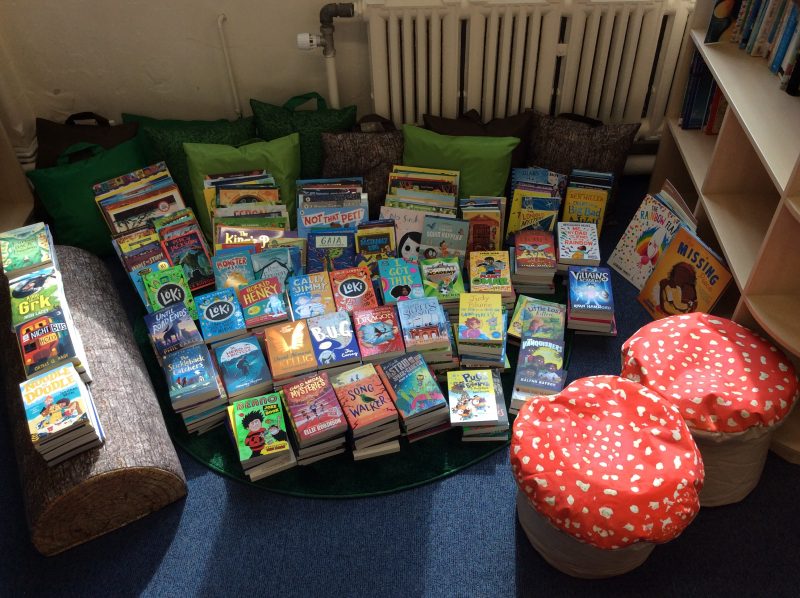
World Book Day
We celebrated World Book Day this year with a range of exciting activities. The children(and staff!) came to school wearing a variety of different outfits. Many came in pyjamas to promote the importance of bedtime reading and many came dressed as book characters.
We had a visit from Curtis Watt a local poet, author, musician and actor. He has written and performed many poems, raps, songs and music. He spent time in every class sharing some of his work with the children and encouraging them to write their own poems.
Each class also had stories around the firepit. It was a beautiful, sunny day and the children were able to sit in the sunshine, eat s’mores and enjoy a story while sitting around the firepit.
The school council visited WHSmith to collect a selection of World Book Day books so that every child could take a book home with them.
Each class took part in a competition to doodle their thoughts about books and stories. There were some fabulous doodles which showed just how much our children enjoy their story times, reading lessons and independent reading time. A winner was chosen from each class and they were able to select a brand new book of their own choice as their prize.
The children had a wonderful day celebrating the joy of reading!
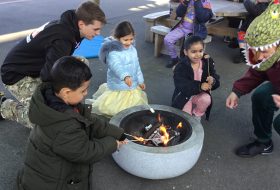
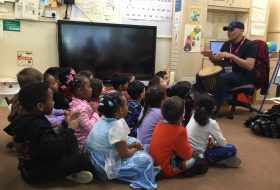
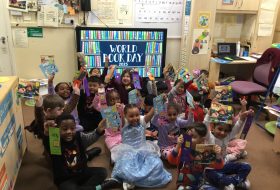
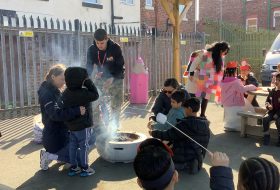
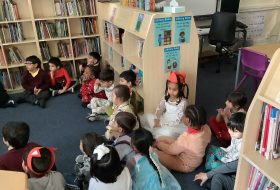
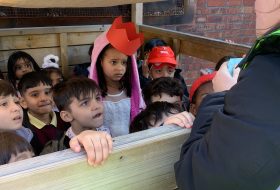
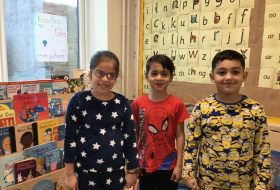
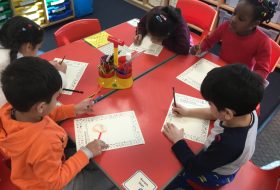
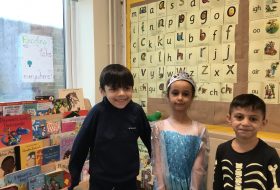
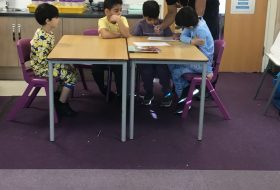
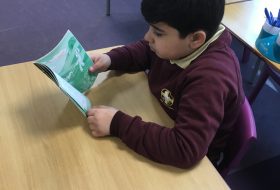
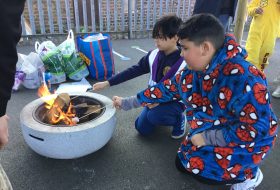
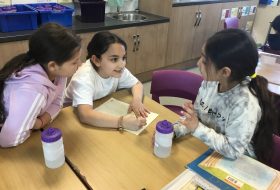
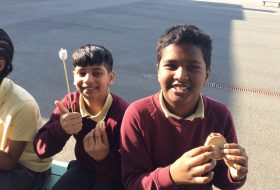
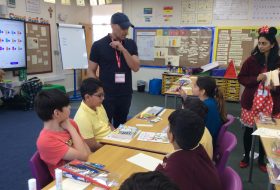
Year 6
We went on an exciting trip to the Liverpool Central Library for a tour. We began our visit in the children’s section, where we explored a wide range of books and learned about the Library’s history, including how it has grown over the years to serve the community. Our journey continued into the magnificent Picton Reading Room, a grand circular space filled with towering bookshelves and stunning architecture.
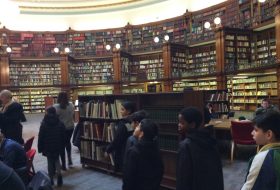
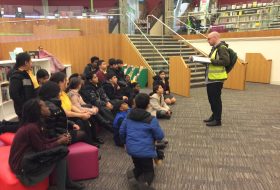
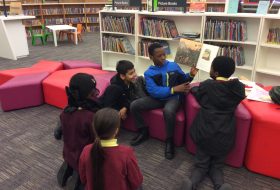
Year 6
We really enjoyed our visit to the Big Little Library in Belle Vale, we spent a lovely afternoon exploring a wide variety of books. Even Mr. Bruce joined in, finding a quiet moment to sit down and read with us. The visit ended with the opportunity to take some books and enjoy reading them at home.
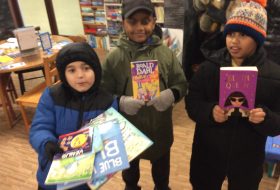
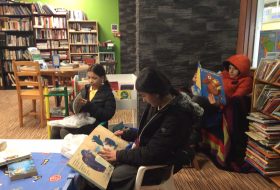
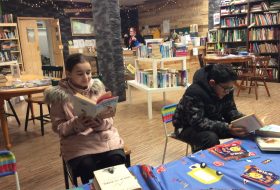
Altru Theatre Company Visit
The children were thrilled by a visit from Altru Theatre Company, where they enjoyed a captivating performance of The Emperor’s New Clothes. The story highlighted the importance of forming their own opinions and resisting the influence of others—a meaningful lesson for us all!
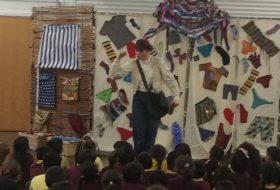
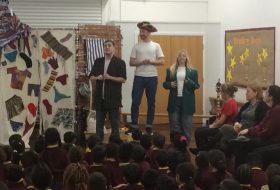
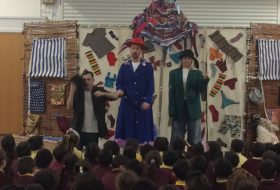
The Big Little Library
The Big Little Library has generously donated four Advent book boxes to our school. Every day during Advent, each KS2 class can open their box to discover a new book to take home or add to our class libraries.
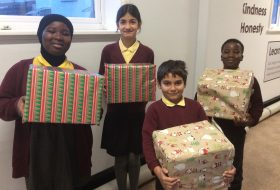
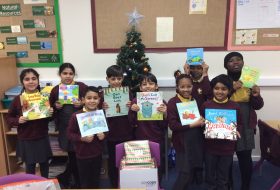
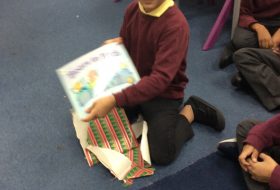
Year 5
We sorted the story of Henry Brown into 3 categories and looked at the themes of each stage of his life.
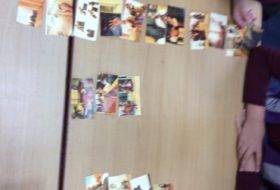
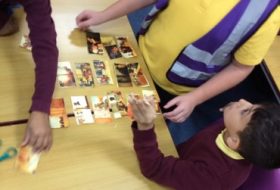
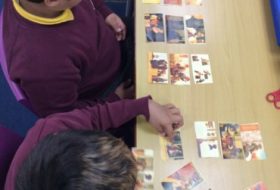
Big Little Library Visit
Year 5 recently visited the Big Little Library, managed by Gateacre School in Belle Vale. They enjoyed a delightful afternoon exploring the books and selecting a few to take home. Some students even donated their own books in exchange for new ones.
The Big Little Library is a beloved community initiative that has been a cornerstone of Belle Vale Shopping Centre for over nine years. It recently celebrated a significant milestone by giving away its 250,000th book
One of the unique aspects of the Big Little Library is that all the books are free, ensuring everyone has access to quality reading material regardless of their financial situation. The library is open Monday to Friday, from 10 am to 4 pm, and always welcomes new visitors
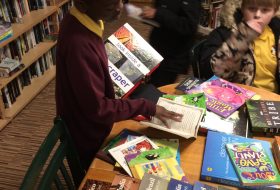
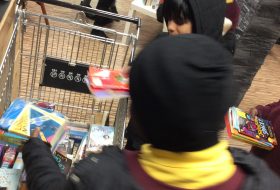
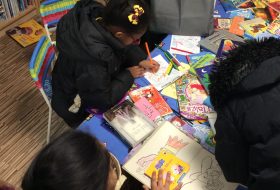
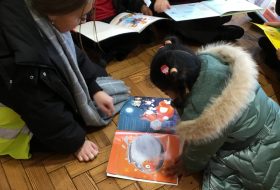
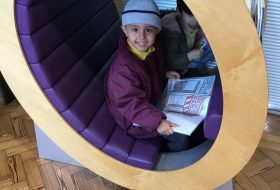
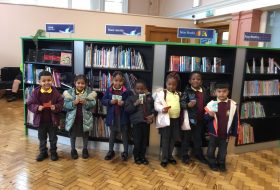
Coram Beanstalk
Each week, two dedicated volunteers from the charity Coram Beanstalk visit us to read and share books with some of our children. Recently, Coram Beanstalk organised a special outing for some of our children to attend their Beanstalk BookFest, where the children had the exciting opportunity to meet author Maria Motunrayo. She shared her book, Koku Akanbi, reading passages and answering the children’s questions. They even returned with signed copies of her book as a memorable keepsake!
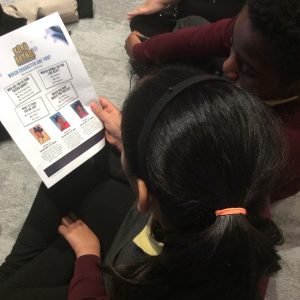
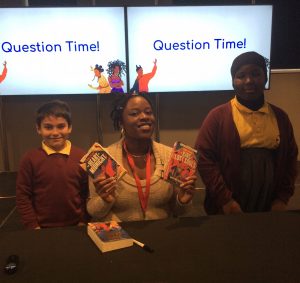
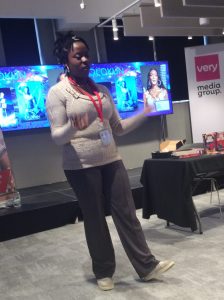
Parents learning about Phonics
Reception and Year 1 parents have been learning about phonics and how they can support their children at home to develop early reading skills. Mrs Flood demonstrated some of the resources and explained how phonics is taught at St. Hugh’s using Read Write Inc. (RWI). Mrs Baddeley also taught a small part of a phonics lesson to the parents so they could see how much fun the children have while learning to read!
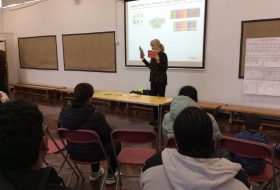
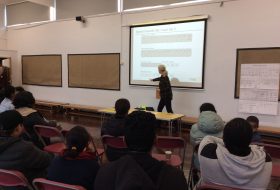
For more information about how you can support your child at home, please click on the following link, Read Write Inc. Phonics – Learning to read at home
World Book Day 2024
World Book Day was created by UNESCO in April 1995. It is currently commemorated in over 100 countries in the world and its roots lie in the celebration of reading and books.
It aims to encourage children to explore reading for pleasure and enables every child the opportunity to receive a book annually.
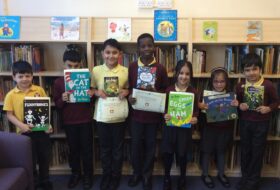
Toxteth Library
‘Reception Class enjoyed their visit to Toxteth Library. We spent time exploring the variety of books in the children’s library and then chose stories to read and listen to as a whole class.’
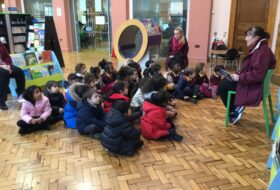
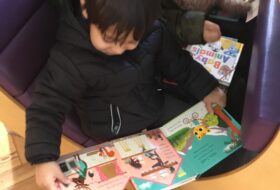
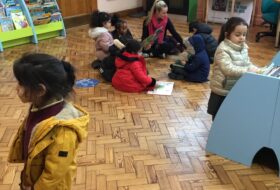
Charlotte’s Web
The whole school enjoyed a festive treat – we watched a production of Charlotte’s Web. We laughed at the funny parts and some of us cried at the sad parts but we all had a fantastic time.
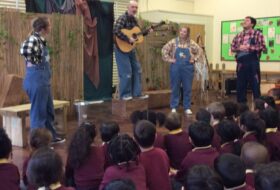
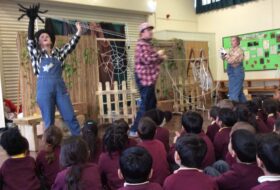
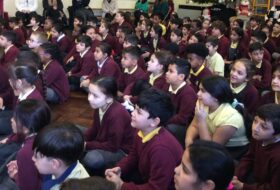
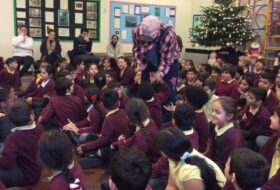
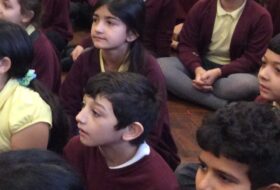
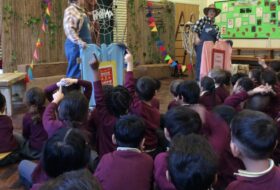
Goldilocks and the Three Bears
Reception and Year 1 enjoyed a very special treat along with the children from Chatham Nursery. They watched a travelling theatre group perform Goldilocks and the Three Bears. It was very funny when Goldilocks sat on the little chair and broke it!
